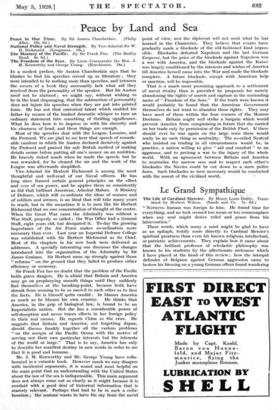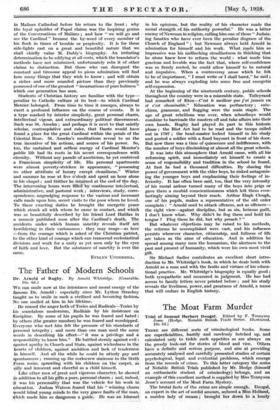Le Grand Sympathique
" NOTHING human was foreign to him. He found time for everything, and no task seemed too mean or too commonplace when any soul might derive relief and peace from his intervention."
These words, which many a saint might be glad to have as an epitaph, testify more directly to Cardinal Mercier's spiritual greatness than even his known religious, intellectual, or patriotic achievements. They explain how it carne about that the brilliant professor of scholastic philoSophy was known to his students by the affectionate nickname which I have placed at the head of this review ; how the intrepid defender of Belgium against German aggression came to bestow his blessing on a young German officer found wandering
in Malines Cathedral before his return to the front ; why the loyal upholder of Papal claims was the inspiring genius of the Conversations of Malines ; and how " we will go and see the Cardinal " became the by-word of every member of his flock in times of trouble or perplexity. It is for these side-lights cast on a great and beautiful nature that we shall chiefly value M. Dubly's biography. An irritating determination to be edifying at all costs, which the translator's methods have not minimized, unfortunately robs it of other claims to distinction. But those who can disregard the constant and tiresome appeal to pious admiration will find here `many =things that they wish to know ; and will obtain a richer and more • rounded picture than they previously possessed of one of the greatest "-incarnations of pure holiness " which our generation has seen.
Students of Christian history are familiar with the type— peculiar to Catholic culture at its best—to which Cardinal Atercier belonged. • From time to time it emerges, always to exert a profound influence on the course of events. It is a type marked by interior simplicity, great personal charm, intellectual vigour; and extraordinary political discernment. Such was 'St. Ansehn ; and perhaps it is next to that saintly scholar, contemplative and ruler, that Dante would have found a place for the great Cardinal within the petals of the Celestial Rose. St. Ansehu's meditations reveal to us the true. incentive of his actions, and source of his power. So, -Lob, the sustained and selfless- energy of Cardinal Mercier's public life had its roots in his secret correspondence with eternity. VVithout-any parade of asceticism, he yet contrived a Franciscan simplicity of life. His personal apartments were almost poverty-stricken in appearance, " possessing no other attribute of luxury except cleanliness." Winter and summer he rose at five o'clock and spent an hour alone in his chapel ; and thither he returned at the end =of the day. The -intervening hours were-filled by continuous inteaectual, administrative, and pastoral work ; interviews, study, corre- spondence, ungrudging response to the various and incessant calls made upon him, secret visits to the poor whom he loved. To these exacting duties he brought the energetic peace which struck all with whom he came in contact, and which was so beautifully described by his friend Lord Halifax in a memoir published soon after the Cardinal's death. The accidents under which huinan sanctity reveals itself are bewildering in their variousness : they may range—as here' =from the courage which -is asked of the Christian patriot_ to the other kind of courage which can transcend ecclesiastical divisions and work for a unity as yet seen only by the eyes of faith and love. But the substance of sanctity is ever the same.
EVELYN UNDERHILL.









































 Previous page
Previous page